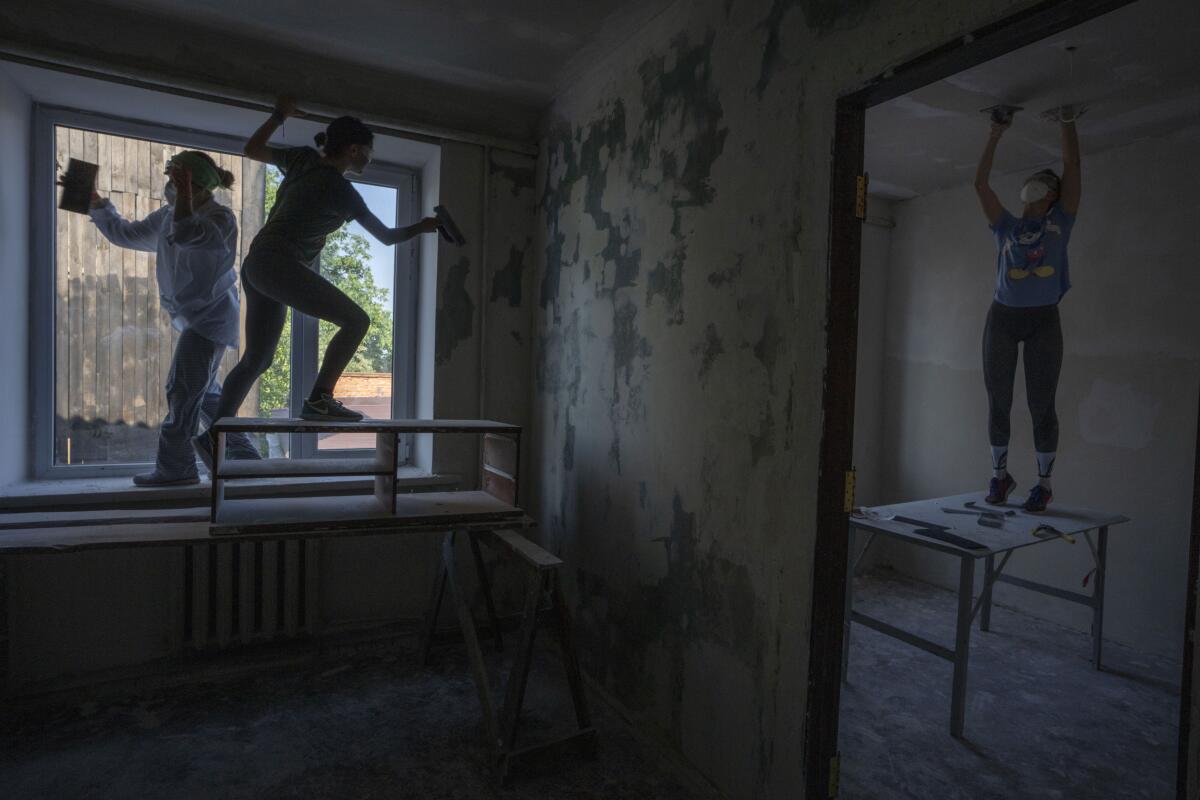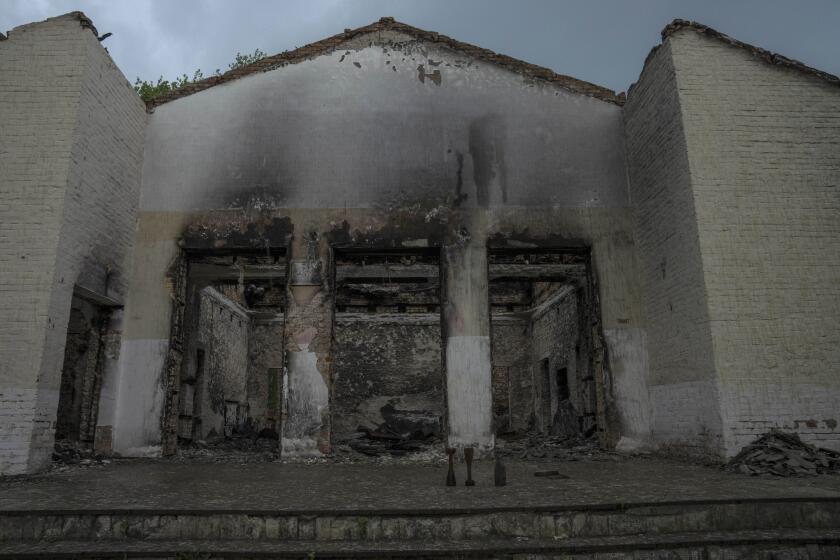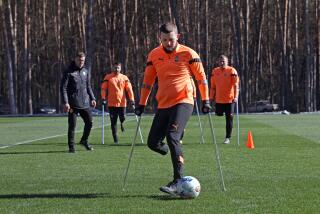‘We cannot pause our lives’: Ukrainians begin rebuilding

- Share via
YAHIDNE, Ukraine — On the outskirts of a Ukrainian village stand the remnants of a small school that was partially destroyed in the early weeks of the Russian invasion.
Surrounded by tall pine trees, the school’s broken windows offer glimpses of abandoned classrooms that are unlikely to see students again anytime soon. It is just one of many buildings in Yahidne that were shattered by the war.
But this village and others are gradually returning to life a few months after Russian troops retreated from the northern Chernihiv region. Now people are repairing homes, and the sound of construction tools fills the air. Volunteers from all over Ukraine, and from other countries, are coming to help because there is so much to do before another winter approaches.
Among the workers are a copywriter and a cameraman who have been repairing the roof of the apartment block in front of the school for several days under a scorching sun.
Denys Ovcharenko, 31, and Denys Huschyk, 43, came from the capital, Kyiv. They joined a volunteer building organization called Dobrobat, a name that combines “dobro,” or kindness, with “bat” for battalion.
The men and 22 other volunteers help their compatriots return to their homes as soon as possible.
“While the guys are protecting us, we work here,” Huschyk said, referring to troops at the front.
No one in the village yet plans to rebuild the school, which was used by the Russians as a base. Villagers prefer not to mention the place at all.
Most of Yahidne’s residents — almost 400 people — spent a month in the school’s basement, where they were held around the clock as human shields to protect against an attack by the Ukrainian army.
NATO gets blowback from Moscow and Beijing after it declared Russia a ‘direct threat’ and said China posed ‘serious challenges’ to global stability.
Only occasionally did the Russian troops allow villagers to climb upstairs and enter the yard. But that was not enough. Ten people died in the dark, crowded basement. Survivors blame the lack of fresh air.
The Russians left the village at the end of March.
The Dobrobat group plans to repair the roofs of 21 houses in the coming weeks. The volunteers include teachers, athletes and programmers. About 80% of them have no experience in construction.
Yahidne is just one of the villages in northern Ukraine that suffered from Russia’s aggression. And Dobrobat is just one of the groups responding, sometimes drawing volunteers from beyond Ukraine.
A father and son from the Czech Republic decided to spend their annual family trip in Ukraine this year. Michal and Daniel Kahle see each other for only a few weeks each summer, as the son studies in the United States.
“We wanted to do something meaningful instead of just being tourists,” said Daniel, 21.
That’s how they came to the town of Makariv in the Kyiv region. Many buildings there were destroyed or damaged in the first weeks of the war.
Russia has pulled back from a Black Sea island that its forces took early in the war but where they have faced relentless Ukrainian attacks.
Father and son joined the youth volunteer movement Building Ukraine Together, which since 2014 has helped restore damaged buildings in eastern Ukraine. For several days, together with young people from different parts of Ukraine, they worked to rebuild the Makariv fire department, which was hit by an artillery shell on March 12.
“It’s a long game. We cannot pause our lives, sit at home and wait for the war to end,” said Tetyana Symkovych, the volunteer group’s coordinator in Makariv.
Many Ukrainians volunteer because they want to be helpful. But that is not the only reason Yulia Kapustienko comes to the fire department every morning to putty the walls. At the end of April, the young woman left Mariupol after spending two months in the besieged port city.
“I saw dead bodies and burned houses. Still, when I see a normal house, I automatically imagine what will happen to it after the rocket hits,” she said. “It is impossible to erase this from your mind. But at the same time, I try not to get stuck in the past, so it is important for me to do something, to take responsibility.”
The 23-year-old is originally from Horlivka in the eastern Donetsk region. Her first experience of armed occupation was in 2014. After that, she cried for three years, unable to endure the loss of her hometown.
This time, she chose a different strategy.
“I know now that you need to do something,” Kapustienko said. “I don’t care what to rebuild. The main thing is for it to be in Ukraine.”
More to Read
Sign up for Essential California
The most important California stories and recommendations in your inbox every morning.
You may occasionally receive promotional content from the Los Angeles Times.












